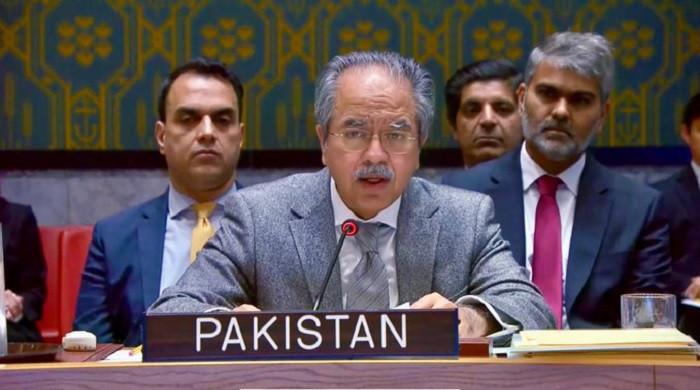- Pakistan urges global action to curb Afghan weapons flow.
- Says illicit Afghan arms direct danger to neighbouring countries.
- Non-state actors using advanced weapons intensifying terror threats.
Pakistan cautioned the UN on Monday that the free movement of illegal arms within Afghanistan, many of them modern weapons now used by anti-Pakistan militant outfits, represents a serious regional risk and a key point of friction in its troubled relationship with Kabul.
Ambassador Asim Iftikhar Ahmad, Pakistan’s Permanent Representative to the UN, raised the issue during the UN Security Council Open Debate on Small Arms, stressing that Islamabad remains deeply concerned about developments in Afghanistan.
“Pakistan is seriously concerned about the presence of stockpiles of sophisticated arms and ammunition in Afghanistan, as noted in the findings of the Secretary General’s reports,” the ambassador told the members in attendance.
“These sophisticated weapons pose a direct threat to neighbouring countries.”
The Pakistani and Afghan militaries clashed last month, killing dozens, in the worst violence since the Taliban returned to power in Afghanistan in 2021.
Both sides signed a ceasefire in Doha in October, but negotiations in Istanbul ended without a long-term deal due to a disagreement over militant groups hostile to Pakistan that operate inside Afghanistan.
Pakistan has repeatedly shared its concerns related to the presence of Fitna-al-Khawarij and Fitna-al-Hindustan operating from Afghan soil, and it expects concrete and verifiable actions against these terrorist elements by the Taliban regime.
Citing smuggling networks and local threats, Ahmad said, “We also have credible information of attempts to smuggle these arms to neighbouring countries for terrorist activities.
“Weapons confiscated at the Pakistan-Afghanistan border are traced back to stockpiles of weapons left behind by foreign forces in Afghanistan and illegal weapons being sold across black markets in Afghanistan.
“The movement of unmarked or unregistered weapons across the international border sustains and aids non-state armed groups, terrorist networks, and criminal gangs, undermining regional security and stability,” he said.
Ambassador Ahmad also detailed the impact on Pakistan, saying, “We are also deeply concerned at the acquisition and use of these mostly abandoned, modern and potent weapons by terrorist groups based in Afghanistan, which continue to pose a serious challenge to peace and security in Pakistan and the broader region.”
Highlighting the specific groups responsible for attacks, Pakistan’s UN envoy said that terrorist entities including Daesh-K, TTP(Tehreek-e-Taliban Pakistan), Fitna Al Khawarij — a UN listed terrorist organisation — and the BLA (Balochistan Liberation Army) and Majeed Brigade, which operate with impunity from Afghanistan, enabled by external financing and support of principal destabilising actor in the region, “have used these weapons against Pakistani civilians and law enforcement agencies – leading to the loss of thousands of innocent lives.”
“We urge stronger international efforts to prevent access of illicit arms to armed terrorist groups in Afghanistan and to ensure that the Afghan interim authorities adhere to their international obligations and commitments in that regard.
“The international community needs to step up its efforts and plug gaps in its response to effectively address these threats to international and regional peace and security,” he said, stressing international action.
Ambassador Ahmad outlined the broader dangers of illicit arms proliferation.
“The illicit transfer and unchecked use of small arms and light weapons, including their destabilising accumulation, have a direct impact on intensifying and prolonging conflicts, endangering socio-economic progress, and undermining the prospects of peace and security, particularly at the regional and sub-regional levels,” he said.
He stressed the human and social impact, noting, in terms of their impact on local communities, “Small Arms and Light Weapons are neither small nor light.
“Illicit weapons impede development prospects, contribute to human rights abuses and imperil peace, security and stability.”
Quoting the data on global terrorism, he added, “According to empirical data, small arms are the second most used weapons in global terrorist attacks, after explosives.”
Focusing on Africa, Ambassador Ahmad highlighted the region’s vulnerability. “As highlighted by the Secretary-General’s report, Africa is one of the regions most severely affected by the illicit trade, misuse, and diversion of small arms and light weapons.
“Illicit arms have fueled conflicts, amplified internal security threats, serving as tools for terrorism, organised crime, political violence, and the erosion of the rule of law – thus emerging as one of the foremost drivers of instability in the African continent.”
He warned of the growing use of these weapons by non-state actors. “Small arms and light weapons have also emerged as instruments of choice for non-state actors to perpetrate violence.
“These concerns are further exacerbated by the increasing sophistication of illicit arms and the accessibility of modernised weapons to illegal armed groups that frequently operate across national borders.
“Illicit arms, thus, directly threaten national security, impede counter-terrorism operations, and civilian protection,” he said.
The envoy also addressed modern challenges in arms proliferation.
“The evolving nature of warfare and the advent of new technologies present serious challenges in combating the proliferation of increasingly lethal small arms, such as unmanned aerial vehicles, AI-based weapons, 3D-printed small arms, and high-tech night-vision equipment.
“Criminal groups and terrorists are increasingly utilising technologies like cryptocurrency for anonymous transactions and employing the dark web to evade detection when acquiring such weapons,” he said.
Pointing to solutions, Ambassador Ahmad added, “While new technologies have introduced new challenges in manufacturing and proliferation of illicit arms manufacturing, new avenues of effective control and international cooperation have also opened up, which need to be fully utilised.
“Traditional arms control measures, designed for another era before the advent of these new technologies, must keep pace with new developments.”
“We firmly believe that the issue of illicit small arms and light weapons should be addressed comprehensively and in a balanced manner.
“The United Nations ‘Programme of Action on the Illicit Trade in Small Arms and Light Weapons in All its Aspects’ strikes a balance between the legitimate security requirements of states and the imperative to address the issue of illicit arms on both the supply and demand sides.
“We remain committed to its implementation at the national level and call for its full execution at the global level to safeguard and promote international and regional peace and security,” he concluded with a call for balanced and comprehensive action.


